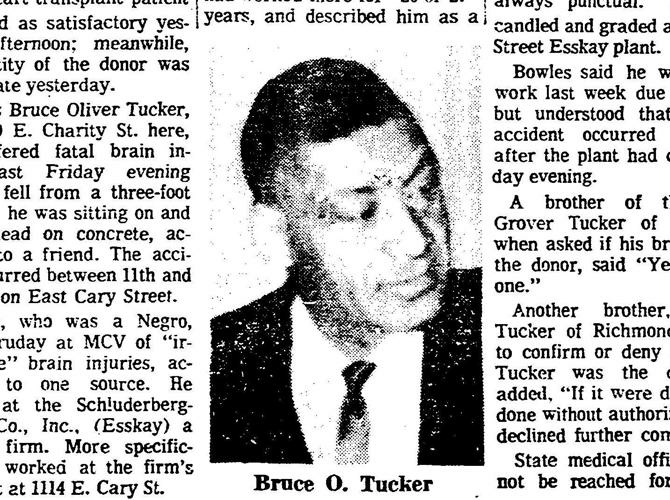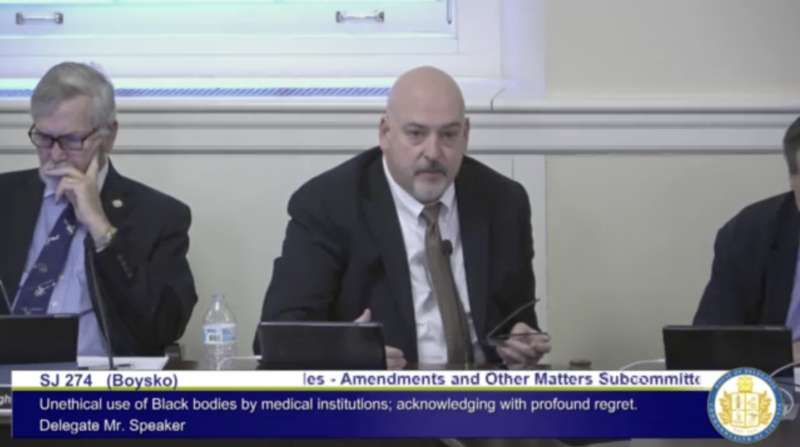Given a chance to apologize for the theft of a Black man’s heart, House Republicans declined.

In what can only be characterized as a stunningly callous decision, last week members of a Rules subcommittee of Virginia’s House of Delegates killed a resolution to acknowledge and apologize for the state-sanctioned medical misuse of Black bodies in Virginia, a common practice in the 19th and 20th centuries.
Four of the subcommittee’s five members – including House Majority Leader Terry Kilgore, R-Scott, Speaker Todd Gilbert, R-Shenandoah, Del. Barry Knight, R-Virginia Beach, and Del. Kathy Byron, R-Bedford – voted to lay SJ 274 on the table, politi-speak for postponing any action on the legislation indefinitely. The measure had sailed through the Senate with unanimous approval and, at least in the mind of Phillip Thompson, who came up with the idea of the bill, was a no-brainer, low-lift way for the state to recognize the wrongs of the past.
“I thought it had a chance because it’s a very innocuous bill,” Thompson told me. “We weren’t asking for reparations, nothing like that; we just wanted a real apology.”
An apology would be the very least the state could do, considering Virginia institutions’ horrible history of using Black people, living and dead, as guinea pigs.
Thompson said he got the idea for the resolution after reading a Politico article in late 2022 that explained how Black laborer Bruce Tucker’s body was violated in the name of a medical miracle after his accidental death in 1968.
A day after he died from a fatal fall, and without his family’s knowledge or consent, Tucker’s “heart was sewn into the chest of a white business executive” at the Medical College of Virginia, the forebear of what is now Virginia Commonwealth University’s School of Medicine, according to Politico’s report. “It was one of the first heart transplants in the country, and it gave the med school the status it had sought at the forefront of transplant science.”
Tucker’s sad fate also underscored Richmond’s record of body snatching, the practice of stealing the bodies of deceased Black people for doctors-in-training to practice dissection. “Resurrectionists” were known to lurk in Black cemeteries in Richmond, seeking to abscond with the remains of the newly dead, according to the documentary “Until the Well Runs Dry: Medicine and the Exploitation of Black Bodies,” directed by Dr. Shawn Utsey, former chair of VCU’s African American Studies Department.
Thompson asked one of his representatives, Sen. Jennifer Boysko, D-Fairfax, to sponsor the bill and advocate for its passage. In her presentation to the House Rules subcommittee last week, Boysko said the healing of old wounds can’t precede acknowledgment that the wounds were inflicted in the first place.
“I think it’s important that we address problems so we can move forward collaboratively,” Boysko told me in a phone interview after her bill was dashed. “We know there are Black people who live in Virginia and around the country who are suspicious of health care because of what has happened in the past. Our bill would have at least admitted that and given people a small peace of mind.”
Thompson agreed, citing some Black Americans’ distrust of the medical community stemming from its past unethical actions that had a deleterious impact on African American health, such as the 40-year-long Tuskegee Experiment. In that case, the government withheld syphilis treatment from hundreds of Black men to study the disease without telling them and then continued to let the disease ravage the men’s bodies, even after penicillin became widely available for treatment.
The Tuskegee Experiment and many other instances of medical mistreatment is “why we had difficulty with the COVID vaccines in the African American community,” Thompson said. “Many of us still don’t trust the system, and when you look at history, that distrust is justified.”
In learning all of this, the question that persists for me is simply, why? What possible reason did Republican lawmakers have to dismiss SJ 274? Kilgore didn’t return my emails or calls seeking an answer, so I have to rely on the sorely lacking response to the legislation by Gilbert, given during the subcommittee meeting on Feb. 17.
“I feel like there are thousands upon thousands of equally painful and hurtful and regrettable stories that could be told about how we treated one another, how Black Americans were treated for a very long time in this country. And I just worry that there’s no end to these resolutions, and maybe that’s the intent, I don’t know,” Gilbert said. “But certainly if it helps for me to acknowledge that fact – that there are these many, many hurtful, painful memories and events and actions that hurt so many people – you know, I’m doing that publicly right now. But I just don’t know in the way of legislation how we contribute to that healing by acknowledging one or two a year at a time. That’s my main concern.”

Let me paraphrase how this message comes across to me, as a Black Virginian interested in righting the wrongs of the past: “There are way too many instances of Black people’s human and civil rights being trampled in the dirt for us to acknowledge them all, so we won’t even try.”
What a cowardly, callous stance to take – and during Black History Month, no less. And while the governor’s administration continues to threaten the teaching of African American history in our schools, and as health disparities persist among Black Virginians. As my late grandmother would say, it is a sin and a shame.
Bruce Tucker’s body parts were stolen, and one of the state’s current leading medical schools pioneered its practice on the literal strength of his heart. To acknowledge and apologize for this horror is the very least this legislature could have, and should have, done. Thompson and Boysko plan to bring the measure before the legislature again next year; let’s hope more sensitive and sensible legislators will then advance what is long overdue.








